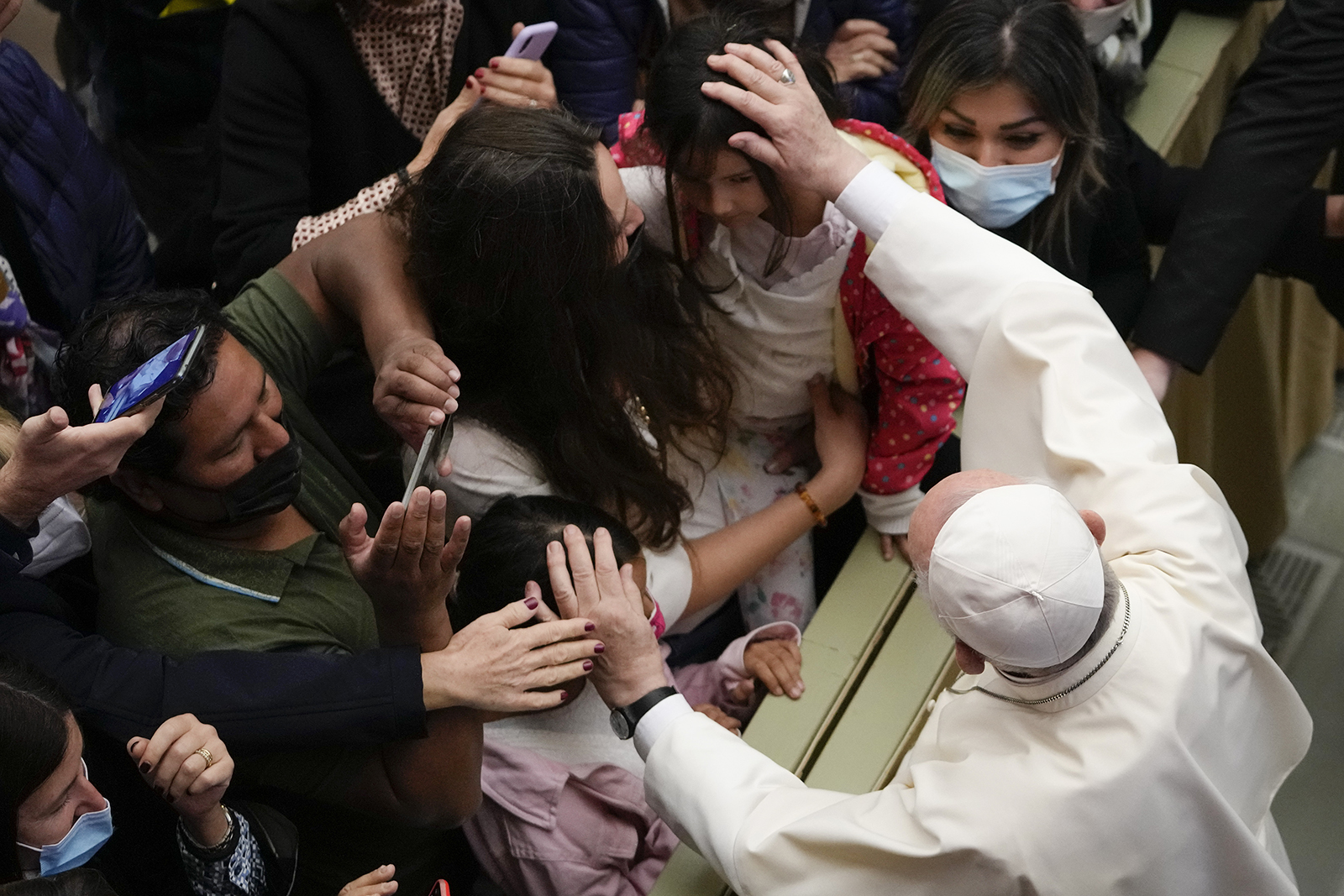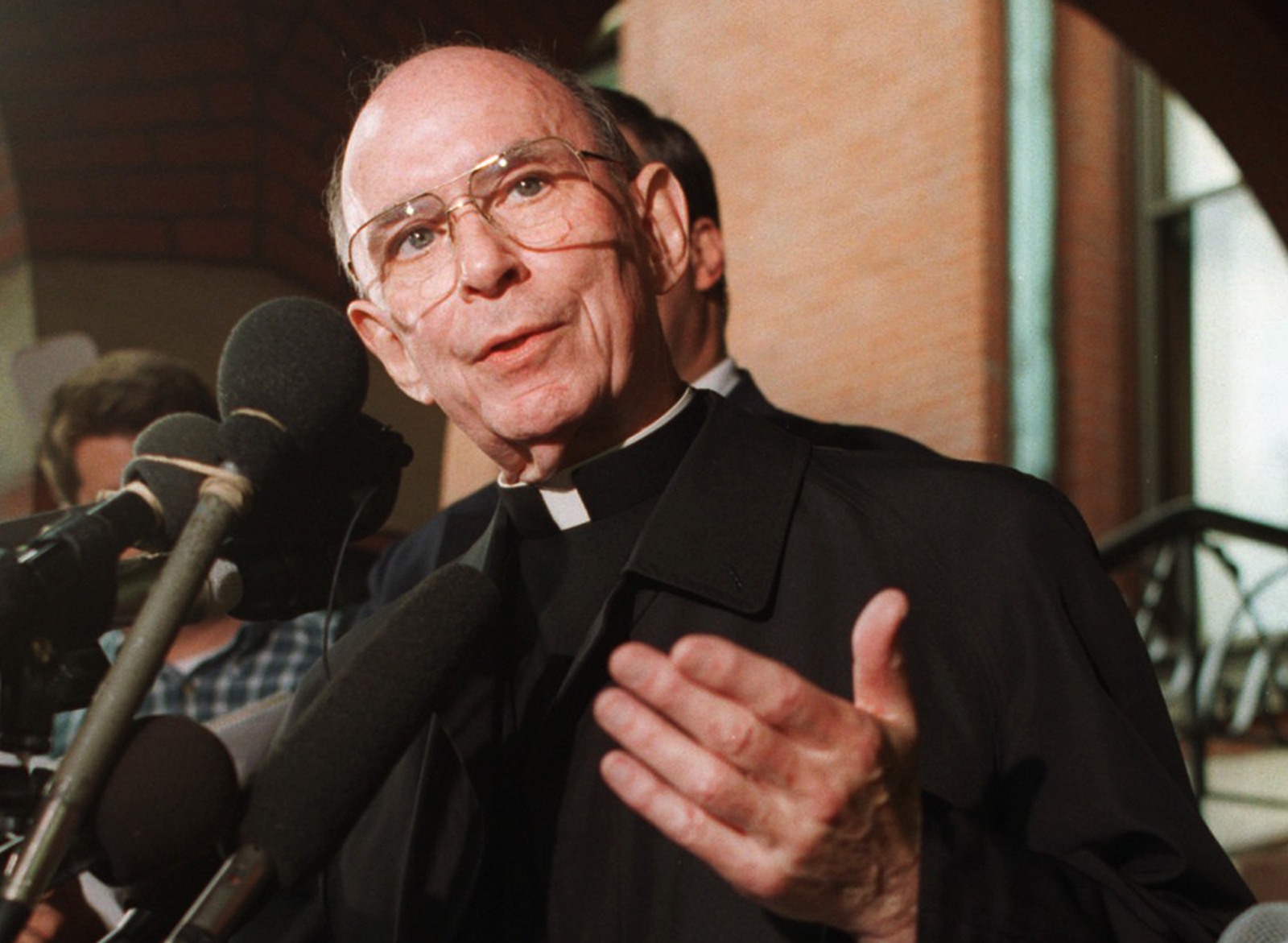[ad_1]
(RNS) – It is extraordinary today to imagine that it once seemed extraordinary for American cardinals to publicly attack another cardinal. In August 1996, after Cardinal Joseph Bernardin of Chicago announced his Catholic Common Ground Initiative, a call for dialogue among increasingly aggressive believers in the American Catholic Church, five cardinals from major American cities issued statements expressing their serious doubts.
It was extraordinary then. But we have come a long way.
Bernardin would succumb to cancer three months later, on November 14, an anniversary that we at Center Bernardin and others across the former Archdiocese of Bernardin observe 25 years later. These events of his last days now deserve some attention.
In Bernardin, Catholics had a leader who anticipated the style and ministry of Pope Francis in his openness to dialogue and his efforts to engage the world in constructive conversations. But Bernardin’s later years also anticipated the kind of opposition Francis faced, especially among American Catholics.
RELATED: Pope Francis calls for greater female leadership ahead of G-20 summit
The seeds of our divisions, as Catholics and Americans, were watered in 1996. As these seeds bloomed and spread in 2021, we can look back on Bernardin to understand what happened and how. things could be different.
Bernardin was the Roman Catholic Archbishop of Chicago from 1982 until his death, but his importance extended far beyond Chicago. No bishop in the United States could be more associated with the church’s post-Vatican II efforts to engage and embrace the modern world as St. John XXIII had hoped when he called the council. Bernardin once wrote that his entire ministry had “taken place in the shadows (of the Vatican Council II)”.
Yet Bernardin’s impact was not limited to the Catholic Church. In 1996, John Rawls – a liberal philosopher committed to eliminating religion from public discourse – recognized that the coherent living ethic advocated by Bernardin “is clearly expressed in a form of public reason.” No achievement better illustrates Bernardin’s ability to argue Catholic moral positions in terms accessible to non-believers, or his commitment to bringing Catholicism to the world.
The Catholic Common Ground initiative was Bernardin’s final and most substantial effort to promote dialogue in an increasingly divided Catholic Church. Beginning in 1992, Bernardin worried about how divisions over political issues and the implementation of Vatican II were beginning to disrupt parish life. With Monsignor Philip Murnion, he began to work discreetly to bring together Catholic bishops and influential laity who were committed to dialogue and to the unity of the Church despite their disagreements.
The initiative challenged American Catholics to honestly discuss their views on the role of women in the church, human sexuality, and how the church is governed.
Saint John Paul II places a red bar on the head of Archbishop Joseph L. Bernardin of Chicago when he was elevated to the rank of cardinal during a consistory of February 2, 1983 at the Vatican. RNS archive photo
Bernardin hoped that such a conversation would testify to how Catholics with very different opinions can dialogue with other believers in the same gospel. It would be a model for parishes, dioceses and Catholic organizations. The Catholic Common Ground Initiative is still a program of the Bernardin Center today.
When Bernardin announced Common Ground shortly before his death, surely he was hoping to leave a gift to guide the church through a difficult time. But Cardinals Anthony Bevilacqua (Philadelphia), James Hickey (Washington), Bernard Law (Boston), John O’Connor (New York) and Adam Maida (Detroit) opposed Common Ground. Law caught the flavor of the critics when he said: “Dialogue as a means of mediating between truth and dissent is mutual deception.”
The New York Times called the attacks on the initiative “unusual”. It was an understatement. Nothing like this had ever happened before.
Bishops are supposed to work for collegiality and unity (at least in public) for the good of the church. An accomplished clergyman, Bernardin had circulated his announcement among these cardinals for their comments before its public release so that they would not be surprised when the announcement was made. The Cardinals made no comment and made no objections – until their press releases attacking the initiative after the announcement. Together, these five cardinals have closed the door to dialogue. The church and the world have reaped the consequences.
Today, when Francis calls for dialogue on married priests in the Amazon, or communion for divorced and remarried Catholics, or equal rights to civil marriage for LGBTQ + people, he meets the same opposition as the call to Bernardin dialogue met. For many Catholics, dialogue seems like a surrender or a surrender, and too many Catholics today are so sure they feel entitled to say the Pope is wrong.
This vision, and these Catholics, have been ascending in the 25 years since Bernardin’s death. This trend has had an impact on the Catholic Church, of course, but there have also been consequences outside the Church.
Catholics have a profound influence on life in the United States. Generally, we say there are 70 million Catholics in the United States (although that number almost certainly does not reflect the exodus since Cardinal Theodore McCarrick’s revelations and the pandemic). Over the past 25 years, this large part of the population has learned to be suspicious of dialogue, and in turn the polarization of Catholics has led to a broader polarization in the abortion debate, but also in the Obamacare debate, in the vaccination debate and other ways. .
After 25 years of division against each other, American Catholics seem unable to see the different path that Francis tried to show us: the path of dialogue. Acrimony and division have become our tools, our vocabulary and our habit, and we seem unable to find a different path.
 weekly general audience in the Pope Paul VI Hall in the Vatican on October 20, 2021 (AP Photo / Alessandra Tarantino)” width=”800″ height=”534″ srcset=”https://religionnews.com/wp-content/uploads/2021/10/webRNS-Francis-Women1-102021.jpg 1600w, https://religionnews.com/wp-content/uploads/2021/10/webRNS-Francis-Women1-102021-427×285.jpg 427w, https://religionnews.com/wp-content/uploads/2021/10/webRNS-Francis-Women1-102021-807×538.jpg 807w, https://religionnews.com/wp-content/uploads/2021/10/webRNS-Francis-Women1-102021-768×512.jpg 768w, https://religionnews.com/wp-content/uploads/2021/10/webRNS-Francis-Women1-102021-1536×1024.jpg 1536w, https://religionnews.com/wp-content/uploads/2021/10/webRNS-Francis-Women1-102021-624×416.jpg 624w, https://religionnews.com/wp-content/uploads/2021/10/webRNS-Francis-Women1-102021-300×200.jpg 300w, https://religionnews.com/wp-content/uploads/2021/10/webRNS-Francis-Women1-102021-600×400.jpg 600w” sizes=”(max-width: 800px) 100vw, 800px”/>
weekly general audience in the Pope Paul VI Hall in the Vatican on October 20, 2021 (AP Photo / Alessandra Tarantino)” width=”800″ height=”534″ srcset=”https://religionnews.com/wp-content/uploads/2021/10/webRNS-Francis-Women1-102021.jpg 1600w, https://religionnews.com/wp-content/uploads/2021/10/webRNS-Francis-Women1-102021-427×285.jpg 427w, https://religionnews.com/wp-content/uploads/2021/10/webRNS-Francis-Women1-102021-807×538.jpg 807w, https://religionnews.com/wp-content/uploads/2021/10/webRNS-Francis-Women1-102021-768×512.jpg 768w, https://religionnews.com/wp-content/uploads/2021/10/webRNS-Francis-Women1-102021-1536×1024.jpg 1536w, https://religionnews.com/wp-content/uploads/2021/10/webRNS-Francis-Women1-102021-624×416.jpg 624w, https://religionnews.com/wp-content/uploads/2021/10/webRNS-Francis-Women1-102021-300×200.jpg 300w, https://religionnews.com/wp-content/uploads/2021/10/webRNS-Francis-Women1-102021-600×400.jpg 600w” sizes=”(max-width: 800px) 100vw, 800px”/>
Pope Francis greets people at the end of his weekly general audience in the Pope Paul VI Hall in the Vatican on October 20, 2021 (AP Photo / Alessandra Tarantino)
We all need to do better, but Catholics in particular have a responsibility both because of the part we played in dividing and because of what Catholics believe. On this 25th anniversary of Bernardin’s death, we can look to him for guidance as we try to find a way out of the hostility to dialogue in which we have been trapped since the 1990s.
We like to say that Bernardin was an apostle of reconciliation or of dialogue or of peace. It’s true. But as director of the Bernardin Center and as Bernardin’s biographer, I prefer to say that he witnessed the hope that such things were possible.
Hope must come first. From hope, we can begin and continue the paths of peace that seem impossible. Hope is our license to believe in the impossible.
RELATED: It’s Time To End The Catholic Church’s Abortion Culture Wars
After launching the initiative, Bernardin was asked why he chose to try to mount such an effort when he had so little time to live. He reminded us that “a dying person has no time for the device, the accidental”, and said: “It is wrong to waste the precious gift of time given to us, as chosen servants. of God, in acrimony and division.
Bernardin wanted his death to bear powerful witness to the absurdity of our angry divisions. He offered his death as an encouragement to seek dialogue and peace. He also quoted Vatican Council II: “May unity be in what is necessary, freedom in what is doubtful, and charity in everything.
Bernardin knew this would be one of his last public words. Today, many years later, it is up to all of us to keep the hope they represent alive. The path of dialogue can heal divisions among Catholics, but dialogue is also a powerful message that Catholics can pass on to the rest of our angry and hurt world.
François understands. In his most recent encyclical on social friendship he writes: “I invite everyone to renewed hope. Even today, the same hope that we can be agents of reconciliation and peace to which Bernardin invited us is still possible.
(Steven P. Millies is professor of public theology and director of the Bernardin Center at the Catholic Theological Union. The views expressed in this commentary do not necessarily reflect those of Religion News Service.)
[ad_2]

